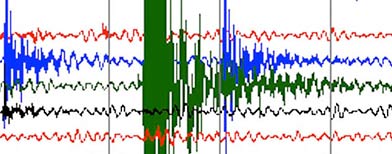Ark. cities feel unexplained surge in earthquakes
By SARAH EDDINGTON, Associated Press – Thu Feb 17, 9:45 am ET
LITTLE ROCK, Ark. – Jim Sutterfield was briefly puzzled by a thumping sound that seemed to slam the back of his office chair. But when the small-town Arkansas fire chief turned and saw no one was around, he quickly realized it was just an earthquake — again.
"That was only my second time to feel one, but others here have felt them for three or four months now," Greenbrier chief Jim Sutterfield said after feeling the latest tremor on Wednesday. "Now when it happens, people say, 'Well, there's another one.'"
Several small earthquakes ranging in magnitude from 1.8 to 3.8 have rattled the north-central Arkansas cities of Greenbrier and Guy this week, and the cause is unknown.
The U.S. Geological Survey has reported more than 30 earthquakes in the area since Sunday, including a magnitude 3.8 quake Thursday morning and at least 16 others occurring Wednesday, two of which were magnitude 3.2 and 3.5. More than 700 quakes have occurred in the region over the past six months.
Scott Ausbrooks, geohazards supervisor for the Arkansas Geological Survey, said the quakes are part of what is now called the Guy earthquake swarm — a series of mild earthquakes that have been occurring periodically since 2009. A similar swarm occurred in the early 1980s when a series of quakes hit Enola, Ark.
Ausbrooks said geologists are still trying to discover the exact cause of the recent seismic activity but have identified two possibilities.
"It could just be a naturally occurring swarm like the Enola swarm, or it could be related to ongoing natural gas exploration in the area," he said.
A major source of natural gas in Arkansas is the Fayetteville Shale, an organically-rich rock formation in north-central Arkansas. Drillers free up the gas by using hydraulic fracturing or "fracking" — injecting pressurized water to create fractures deep in the ground.
Ausbrooks said geologists don't believe the production wells are the problem, but rather the injection wells that are used to dispose of "frack" water when it can no longer be re-used. The wastewater is pressurized and injected into the ground.
"We see no correlation between natural gas production wells and earthquakes, but we haven't ruled out injection wells," he said, adding that if production wells were the cause, the earthquakes would be scattered all over the region underlain by the Fayetteville Shale formation and not in just one area.
Ausbrooks said the earthquakes are occurring in the vicinity of several injection wells.
Guy Police Chief Dave Martini said the locals continue to blame the gas companies for the quakes.
"We have a disposal well here just outside of the city," Martini said. "People are suspecting that to be causing it, even though there isn't any proof of that."
Martini said the earthquakes started increasing in frequency over the past week and that the disposal well has seen an increase in use recently.
Lawrence Bengal, director of the Arkansas Oil and Gas Commission, said a six-month moratorium was established in January on new injection wells in the area. He said four companies are operating already-drilled injection wells: SEECO Inc., Chesapeake Operating Inc., Clarita Operating LLC and Deep-Six Water Disposal Services LLC.
The moratorium, which is expected to end in July, is intended to allow time to study the relationship — if any — between the injection wells and earthquakes in the area.
The largest quake of the Guy Earthquake Swarm was a magnitude 4.0, which occurred in October, Ausbrooks said. The region could possibly see quakes reaching as high as 5.0, but he said anything above 6.0 is unlikely.
The magnitude scale for earthquakes is logarithmic, meaning a magnitude 3 earthquake would produce waves with amplitudes 10 times greater than a magnitude 2 and 100 times greater than a magnitude 1. Geologists say quakes of magnitude 2.5 to 3.0 are generally the smallest felt by humans.
"These periods of high activity are not uncommon. I don't think it's anything to be overly concerned about," Ausbrooks said. "We always encourage people to keep tuned in to what's going on and to always have an all-hazards disaster preparedness kit."